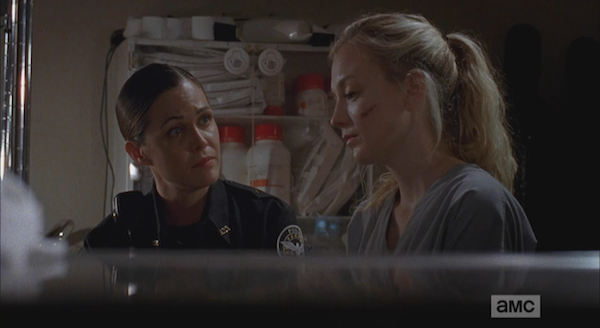November 29, 2014
Science fiction leads the way in promoting gender equality

Last week, I wrote about the Bechdel test, which measures how well the entertainment industry promotes gender equality. It seems simple enough — in order to pass, all you need is two female characters with names talking to each other about something other than men. In my experience with TV and books, this turned out to be a rare occurrence.
Since then, I’ve had better luck. Women in several shows I’ve watched have talked to each other about many subjects.
One series that has this in abundance is The Walking Dead. Does that mean that only in a zombie-apocalypse can we imagine women taking on positions of leadership? I hope not. Another one, via my daughter, is My Little Pony. Almost all the characters are female, and they solve problems threatening their world without the help of males on a regular basis.
This brings me to a proposal I would make for beefing up the Bechdel Test. I would like to see the characters talking about how to resolve issues. Tension in drama is often created by presenting the characters with a big task that may not be possible to accomplish given time constraints or opposition from other characters. We look with admiration to those who find ways to overcome these difficult situations.
It could be that we are beginning to see major steps in this direction within the realm of science fiction. This is a genre where writers have often used a future vision or a fantasy world to help present their ideas on how society could or should be.
David Levesley has a piece in The Daily Beast that sees feminism showing up in two sci-fi TV shows: Doctor Who and The Legend of Korra.
That’s why stories that allegorize and analyze abortion or sexual assault are so interesting: they are not just about improving the representation of women, they seek to improve the discussion around them. By extrapolating these topics away from the individual and placing them as higher-stakes problems, what can seem like obtuse or gender-specific topics can be universal concerns if only because viewers are asked to engage with them in a way detached from their complex real-world implications.
As you may know, Doctor Who is an alien time traveller who morphs every couple of years so he can be played by a different actor. For some reason, though, this character — who supposedly is not of our world — only changes into white men. Would it be too unbelievable for us Earthlings if the doctor became a woman? Given that Doctor Who spends much of his time rescuing damsels in distress, it would indeed make things complicated.
Or what if the doctor turned into a black man? If you don’t think that would be a big deal, check out the discussion that ensued when the recently released trailer for the new Star Wars movie showed a black stormtrooper. Kriston Capps writes in The Atlantic:
Earlier today, it seemed like #BlackStormtrooper might actually eclipse #BlackFriday as a trending topic. That’s because the official trailer that aired Friday for the next film in the Star Wars saga— The Force Awakens, directed by J.J. Abrams and scheduled for release in December 2015 — opens on a black man wearing a stormtrooper’s uniform.
Capps makes a good case for black stormtroopers, but why does it even have to be an issue?
Well, at least we’re talking these things out, and saner heads seem to be prevailing for now. And we should keep on talking, because — due to human nature — there may never be a time when we are blind to gender or race, and see only fellow human beings.
